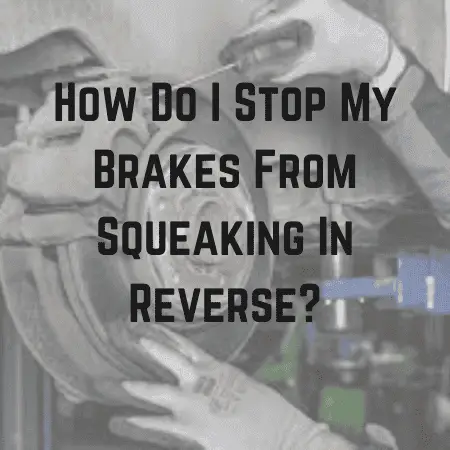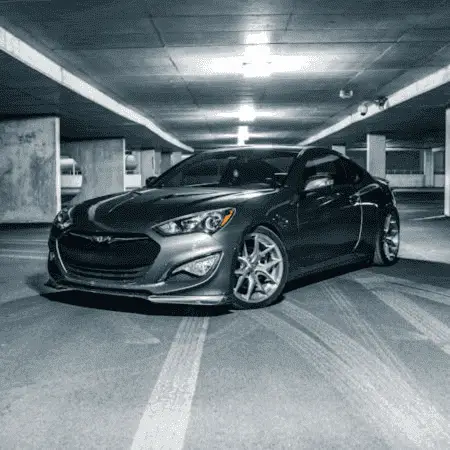If you’ve ever heard an unsettling squeak when reversing your car, chances are it’s coming from your brakes. Brake squeaking can be bothersome and indicative of underlying issues with your vehicle’s braking system. In this article, I will tell you all about “How do I stop my brakes from squeaking in reverse?” So keep on reading…
How do I stop my brakes from squeaking in reverse? To stop brakes from squeaking when you reverse, you can try a few things. First, make sure your brakes are clean and free from debris or dirt that might be causing the noise. You can also try applying brake lubricant to the back of the brake pads where they contact the caliper. This can help reduce friction and prevent squeaking. If your brake pads are worn out, consider replacing them as worn pads can cause squeaking.

what is Brake Squeaking?
Brake squeaking is the high-pitched noise you hear when you press the brake pedal in your car. It happens when the brake pads wear down and rub against the rotors or drums, creating friction and noise. This could be due to dirty or glazed brake pads, moisture, debris, or rust on the brake components.
Causes of Brake Squeaking
Several factors can cause brake squeaking: Such as
1. Worn Brake Pads: Over time, the brake pads in your car wear down due to the friction they endure when you apply the brakes. As they become thinner, they might start to make squeaking noises, especially if they’ve worn down to the point where metal is rubbing against metal.
2. Dirty or Glazed Brake Pads: If your brake pads get dirty or develop a glazed surface, it can interfere with their ability to grip the brake rotors properly. This lack of grip can result in squeaking sounds when you brake because the pads aren’t making solid contact with the rotors.
3. Moisture or Rust: Moisture or rust on the brake components can also cause squeaking. Water and rust can create uneven surfaces on the brake pads or rotors, leading to friction and noise when you apply the brakes.
4. Low-Quality Brake Pads: Sometimes, using low-quality brake pads can lead to squeaking. Inferior materials or poor manufacturing can result in pads that produce noise when they come into contact with the rotors.
5. Improper Installation: If the brake pads or other brake components aren’t installed correctly, it can cause uneven wear and lead to squeaking. Proper installation ensures that the brake pads make consistent contact with the rotors.
6. Faulty Brake Calipers or Hardware: Malfunctioning brake calipers or hardware can also contribute to brake squeaking. Issues such as stuck calipers or worn-out hardware can cause the brake pads to move unevenly or apply pressure inconsistently, resulting in noise.
7. High-Performance Brake Systems: In some cases, high-performance brake systems may produce squeaking noises as a result of their design or the materials used. While these systems are often more effective at stopping your car quickly, they may also be more prone to making noise.
You May Find Helpful
- Drive Start Control Malfunction – Signs & Causes
- Why Does My RPM Go Up And Down While Parked – 6 Main Causes
- How To Manually Engage AC Compressor Clutch – Step By Step Guide

how do You stop Your brakes from squeaking in reverse
1. Clean Your Brakes:
To thoroughly clean your brakes, you’ll want to start by lifting your car safely using a jack and securing it with jack stands. Then, remove the wheels to gain access to the brake components.
Using a brake cleaner spray or a mixture of soapy water, gently scrub the brake pads, rotors, calipers, and hardware with a brush.
Pay close attention to areas where dirt and debris tend to accumulate, such as between the brake pads and rotors. Rinse the components thoroughly and allow them to dry completely before reassembling the wheels.
2. Apply Brake Lubricant:
Once your brakes are clean and dry, it’s time to apply brake lubricant or an anti-squeal compound. These products are specifically designed to reduce friction between the brake pads and calipers, which can help eliminate squeaking noises.
Using a small brush or applicator, apply a thin, even layer of lubricant to the back of the brake pads where they come into contact with the caliper.
Be careful not to apply too much, as excess lubricant can attract dirt and debris, potentially causing other issues.
By thoroughly cleaning your brakes and applying lubricant to the appropriate areas, you can effectively reduce or eliminate squeaking noises when you reverse. These steps not only help improve brake performance but also contribute to a quieter and smoother driving experience.
3- Check for Wear:
When you inspect your brake pads for wear and tear, you’ll want to look closely at their thickness and condition. Most brake pads have a wear indicator a small metal tab that protrudes from the pad. If the pad wears down to the point where this indicator contacts the rotor, it produces a squeaking noise to alert you that the pads need replacement.
However, even without this indicator, you can visually inspect the thickness of the brake pads. If they appear significantly thinner than new pads or if you notice uneven wear patterns, it’s a sign that they’re worn and may need replacing.
Moreover, check for any signs of damage, such as cracks or chunks missing from the pads, as these can also cause squeaking.
4- Inspect Brake Hardware:
Along with inspecting the brake pads, it’s essential to check the condition of the brake hardware. This includes components such as caliper pins, clips, and shims. Look for any signs of damage, corrosion, or excessive wear on these parts.
Damaged or worn hardware can affect the movement of the brake pads within the caliper assembly, leading to uneven pressure and squeaking noises.
Pay particular attention to the caliper pins, as these are critical for allowing the caliper to move smoothly and evenly, ensuring proper brake pad engagement with the rotor.
If you notice any issues with the hardware, such as rust or deformation, it’s advisable to replace them to prevent further brake problems and ensure optimal braking performance.
5- Adjust Brake Calipers:
Brake calipers play a crucial role in your braking system by applying pressure to the brake pads, which then press against the rotors to slow down your vehicle.
If the calipers are misaligned or improperly adjusted, they may not exert uniform pressure on the brake pads, resulting in uneven contact with the rotors. This uneven pressure can cause the brake pads to vibrate or rub against the rotors, leading to squeaking noises.
To address this issue, it’s important to ensure that the calipers are properly aligned and adjusted according to the manufacturer’s specifications. This may involve adjusting the caliper mounting bolts or using special tools to realign the calipers with the rotors.
6- Drive Gently:
Your driving habits can also affect the occurrence of brake squeaking, particularly when reversing. Abrupt or aggressive braking maneuvers can put excessive stress on the brake components, leading to increased friction and potential squeaking.
When reversing, try to apply the brakes gently and smoothly to minimize sudden stops or sharp deceleration. By driving gently, you reduce the likelihood of excessive wear and tear on the brake pads and rotors, helping to preserve their integrity and prevent squeaking noises.
Practice smooth driving techniques promotes overall vehicle safety and prolongs the lifespan of your braking system. So, remember to approach braking maneuvers with care, especially when reversing, to minimize squeaking and ensure a quieter driving experience.
Further Readings
- Benefits Of Removing Thermostat In A Car ( Pros And Cons )
- How To Start A Car With A Bad Crankshaft Sensor?
- How To Clear Engine Derate? Step By Step Guide
- Can Low Oil Cause Misfire? Explained In Detail
Conclusion
Brake squeaking during reverse can be a concerning issue for car owners, but it’s often manageable with the right approach. By understanding the causes, identifying the problem, and implementing preventive maintenance measures, you can effectively stop your brakes from squeaking and ensure safe driving experiences.
